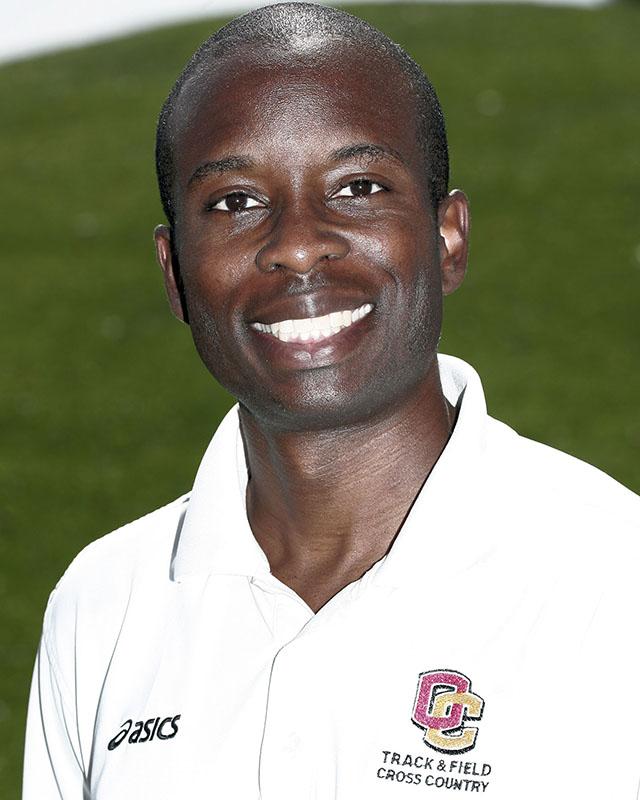Athletics Department Changes Address Community Wellness
Jason Hudson assumed a new role in the Athletics department this year. He is the new director of Student-Athlete Services.
September 12, 2014
Delta Lodge Director of Athletics Natalie Winkelfoos announced on Aug. 27 that Mike Cracas and Jason Hudson would take on new roles within the Athletics Department, both geared toward enhancing the athletic experience of Oberlin students.
Hudson, previously director of student-athlete services, associate head track and field coach and assistant cross country oach, will maintain his position as director of student-athlete services with the added responsibility of the newly created position, director of wellness. While his involvement with the track and field team will not change, Hudson is now no longer involved with cross country.
This added position is meant to “impact the overall wellness of the campus community,” Hudson said.
He added that whereas Student-Athlete services focuses on the experience of Oberlin’s student-athletes, the Office of Student Wellness takes a broader approach, aiming to enhance the experience of all students on campus.
Part of this wider focus concentrates on physical programming, or as Winkelfoos said, “anything we can find to get the campus moving.”
More projects similar to the installation of the new gym under South Hall last year exemplify Hudson’s goals and the goals of Student Wellness; Hudson called this “bringing athletics to the students,” as an alternative to bringing students to Oberlin’s recreational facilities.
Cracas also has begun work to improve the fitness of Oberlin students. After working as the the assistant coach for the women’s soccer team for the past five years and as a monitor for students working in Philips gym, he has now taken on the role of a strength and conditioning coach for all 21 varsity teams.
Cracas will also continue his supervisory responsibilities in his new position as the Assistant director of facilities operations. His level of involvement on the women’s soccer team will not change significantly.
As strength and conditioning coach, Cracas will be developing weight and speed training programs specifically tailored to each team.
“I’ll be working closely with coaches, formulating a program that’s going to work for that sport and for those athletes and then implementing them either in the weight room, Williams, or in our new beautiful stadium,” he said. “[The training programs] will be in addition to practice, but sometimes they will take [the] place of practice as well.”
Athletes on numerous teams are already looking forward to working with Cracas in his new capacity and seeing how he can help improve their game.
“So far we’re all really excited to be working with Cracas,” said junior basketball player Randy Ollie. “He’s really knowledgeable about form and technique in regards to lifting and conditioning, so we definitely feel that in the long run he’ll help us keep our bodies healthy during our season.”
Senior Kate Frost, starting goalkeeper on the women’s soccer team, is similarly optimistic.
“I think Mike [Cracas] is very deserving of this new role, and I think we’re all very excited to work with him in this new setting. I think he can design a soccer-specific program that will really help our team excel.”
While Cracas’s role is aimed more at students’ athletic experiences, Hudson’s responsibility has more to do with making sure students are successful outside of athletics, both in and outside the classroom.
“I’m [the athletes’] link to different services on campus — an in-house counselor, if you will,” said Hudson. “If someone’s struggling in a class, sometimes students aren’t forthcoming with their coaches, so I’ll meet with them and set up a plan to help them be successful.”
Winkelfoos also said that, while Oberlin’s “actually a little behind” in initiating a strength and conditioning program, “our continued focus on the student experience is something we can tout that perhaps other schools cannot.”
Both Hudson and Cracas also cited the enhancement of the student-athlete experience as a mutual goal for their respective positions, specifically aiming to provide students with lasting assets and skills.
“My goal is to teach students how to properly lift, so during summer break or winter term they can go out and do a weightlifting program and be safe,” said Cracas.
Hudson shared this sentiment.
“Everyone wants to win games and be successful, but the other piece of that is, ‘Are you having a positive experience?’ We want to give them tools so that when they leave they can go and be successful.”
The fact that these three administrators all share the same ambitions for Oberlin Athletics is no coincidence. Winkelfoos said that while Cracas and Hudson’s longstanding presence at Oberlin (six and thirteen years, respectively) certainly didn’t hurt their eligibility for these new positions, their shared vision proved they were the right people to spearhead this new change.
“What they’ve been able to illustrate to me is a brand of loyalty, a brand of intelligence and a market for care for our students,” Winkelfoos said. “Any leader needs people around their table that they trust and who are on the same page as them.”
Cracas, Hudson and Winkelfoos’s extended time with the Oberlin Athletics Department has provided the trio with a valuable sense of where the department has come from and where it’s headed.
“We’ve been around long enough to understand Oberlin, and we’ve seen a shift in the culture within the Athletics Department for the better,” Winkelfoos said. “Being able to focus on health and wellness only makes us better and smarter — if we can be better stewards of health and wellness, then we’re a better college.”
















